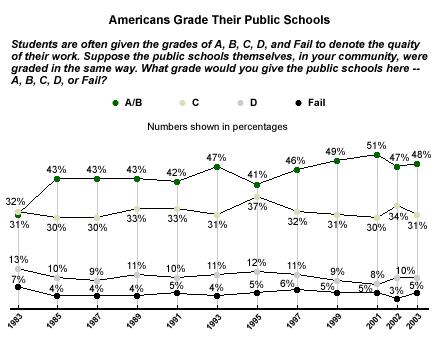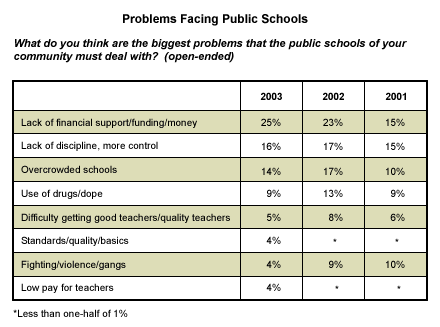This article contains findings from the 35th Annual Phi Delta Kappa/优蜜传媒poll of the Public's Attitudes Toward the Public Schools, released on Aug. 20 in Washington, D.C.
The 2003 PDK/优蜜传媒poll* on public schools reinforces a finding commonly seen in education surveys: the closer Americans are to the schools they're being asked about, the more likely they are to say they approve of them. Almost 7 in 10 public school parents (68%) answer "A" or "B" when asked what grade they would give to the school their oldest child attends. And nearly half of all U.S. adults (48%) give the local schools in their community an A or B.
However, roughly one in four Americans (26%) give the national public school system overall a grade of A or B. Media attention to state budget shortfalls and specific crisis-plagued school districts such as those in New York City may have Americans worried. But despite that bad press, Americans' likelihood to give their local public schools high marks has gradually increased over the last 20 years, from 31% giving an A or B in 1983 to 48% today.

Several demographic groups grade their local schools lower than the national average. Just 30% of nonwhites, for example, give their community schools an A or B, compared to 52% of whites. Because substantial numbers of nonwhites live in urban areas, it is no surprise that just 30% of city dwellers give their local public schools high marks, versus 52% of suburbanites and 58% of rural residents. Forty-five percent of respondents who have no children in school give the community schools an A or B grade, as do 55% of parents with children currently enrolled in public school.
It's the Economy -- Again
Despite the good marks given to local public schools, Americans acknowledge that these schools do have problems. Since 1966, the PDK/优蜜传媒poll has been asking people about problems facing their local schools. Funding woes currently top Americans' list of school concerns, but that's only a recent phenomenon.

Discipline topped the list for 16 of the first 17 PDK/Gallup polls. Drugs moved to the top position in 1986 and stayed there for six years. In 2001, after the economic downturn had officially begun, funding and financial problems tied for the top spot with lack of discipline. In 2002, financial problems surpassed all others on the "biggest problem" list. This issue remains in first place this year, with 25% of Americans naming financial problems as the most important problem facing their community schools.
Discipline issues, which dominated the list for so many years, have retreated to the No. 2 position with 16% of mentions, and drugs are named by just 9% of the population. Fourteen percent mention overcrowded schools as the most important problem facing schools.
Bottom Line
Why do public school parents give high marks to their own children's schools when most Americans have a negative impression of the country's schools overall? One answer is that they have firsthand knowledge of those schools, and witness their accomplishments on a day-to-day basis through the progress of their children. Many parents also volunteer time in their children's schools and get to know the teachers and staff personally.
But firsthand experience is probably just part of the explanation. Parents are not only emotionally invested in the success of their children's schools; they are often financially invested as well. Obviously, public schools are supported largely through local tax dollars. In addition, homeowners are somewhat further invested in their local communities' schools because real estate investments frequently depend, in part, on the reputation of the local schools. Thus, Americans may, to some degree, tailor their perceptions according to their self-interest.
Anne Burns, a New Jersey mother of four, would have given her local school an A. And that rating may have been influenced by a mixture of both emotional and financial investment. "We moved here solely because of the excellent reputation of the public schools and the opportunities they would provide the children. But, having said that, I'm also thrilled that my house has more than doubled in value."
*Findings are based on telephone interviews with a random sample of 1,011 U.S. adults, aged 18 and older, conducted from May 28 to June 18, 2003. For results based on this sample, one can say with 95% confidence that the maximum error attributable to sampling and other random effects is ±3 percentage points.